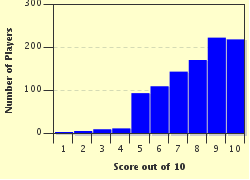Quiz Answer Key and Fun Facts
1. Here's a skyphos of a wonderful red wine from Chios. Speaking of Chios, rumor has it that the blind gentleman standing by the buffet was born there. Did you know that his name literally means 'he who can't see'? They say that he has to dictate his poems for others to write down. Can you guess his name before I introduce you?
2. Was that wine a little too strong for you? You're looking a little queasy. Hey, I know who you should meet! He's over there by the Doric column in the corner. I hear tell that he's starting up a medical school. If anyone can help your stomach issue, it will be him. Oh, you've heard of him? Okay, mister smarty-toga, what's his name, then?
3. Our next party guest is often called the 'Father of History'. What is the name of this very learned historiographer known for his iconic work, named aptly enough, "Histories"?
4. Next to wander in to the party is this Ancient Greek philosopher and mathematician. He is well known for his work on the theorem bearing his name which is still studied today. He was also the founder of a religious movement (again bearing his name). Who just walked in?
5. When we turn to the right hand side of the buffet, we spot a man sampling the grapes from his birthplace Eleusis, while mumbling to himself. You've guessed it. It must be a dramatist. We will leave him alone for now, but who is this writer of such tragedies like "Agamemnon" and "The Oresteia"?
6. Over in the corner, we find a fascinating guest who is often referred to as the 'Father of Geometry'. Who is this master mathematician and author of the influential work known as "Elements"?
7. See that man over there? The one hanging around the snacks? That's the guy who taught Alexander the Great. He is one of the most important philosophers in history. How about you come and meet him? He won't bite; he'll probably interest you with his writings, which covered a huge number of subjects. You do know his name, right?
8. Near the entrance stands a man who is clearly in charge of this party. This is quite logical, since he is one of the influential statesmen of Athens, leading his city empire in the early years of the Peloponnesian War. His father, Xanthippus, was also a politician. Who is this former ruler of Athens?
9. Our next group of guests are three women named Sappho, Praxilla and Korinna. All three of these ladies are well-known for their work in which of the following fields?
10. I can't believe that I haven't introduced you to the host of this little symposium yet! Come on, he's over there by the podium. Geez, it seems like he's always the center of attention. Have you heard about the new teaching style he's been using? Seems a little sketchy to me... all he seems to do is ask questions! What about actually passing on information? Oh, you've heard of him? Tell me his name, then!
Source: Author
reedy
This quiz was reviewed by FunTrivia editor
Exit10 before going online.
Any errors found in FunTrivia content are routinely corrected through our feedback system.

